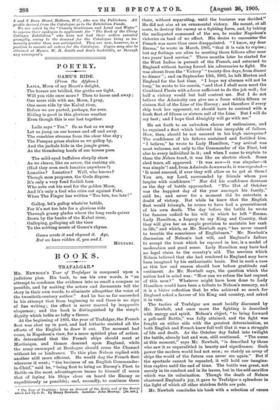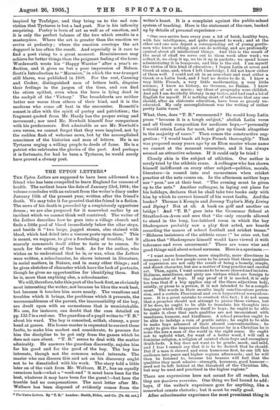TRAFALGAR.*
NEWBOLT'S Year of Trafalgar is composed upon a judicious plan. His book, to use his own words, is "an attempt to condense the evidence into as small a compass as possible, and by making the actors and documents tell the story in their own words, to eliminate altogether the voice of the twentieth-century author." And he has so far succeeded in his attempt that from beginning to end there is no sign of fine writing ; the effect is never marred by inapposite eloquence ; and the book is distinguished by the simple dignity which befits so lofty a theme.
At the beginning of 1805, the year of Trafalgar, the French fleet was shut up in port, and had hitherto resisted all the efforts of the English to draw it out. The moment had come, in Napoleon's view, for a more spirited plan of action. He determined that the French ships should meet at Martinique, and thence descend upon England, while the army encamped at Boulogne should cross the Channel without let or hindrance. To this plan Nelson replied with another still more efficient. He would dog the French fleet wherever it went ; "the business of an English Commander- in-Chief," said he, "being first to bring an Enemy's Fleet to Battle on the most advantageous terms to himself (I mean that of laying his Ships close on board the Enemy as expeditiously as possible); and, secondly, to continue them
, • The Year of Trafalgar: being an Account of the Battle and of the Events which Led Up to It. By Henry Newbolt. London: John Murray. Da. net.1 there, without separating, until the business was decided." He did not aim at an ornamental victory. He meant, at all costs, to destroy the enemy as a fighting force, and, by taking the undisputed command of the sea, to render Napoleon's victories on land of no effect. His desire to encounter the French was more than once disappointed. "I know, my dear Emma," he wrote in March, 1805, "that it is vain to repine ; but my feelings are alive to meeting those fellows after near two years' hard service." Three months later he started for the West Indies in pursuit of the French, and returned to England without having forced his adversaries to fight. He was absent from the 'Victory' "twenty-five days, from dinner to dinner" ; and on. September 13th, 1805, he left Merton and England for the last time. "I hope my absence will not be long," he wrote to his cousin, "and that I shall soon meet the Combined Fleets with a force sufficient to do the job well ; for half a victory would but half content me. But I do not believe the Admiralty can give me a force within fifteen or sixteen Sail of the Line of the Enemy ; and therefore if every ship took her opponent, we should have to contend with a fresh fleet of fifteen or sixteen sail of the Line. But I will do my best; and I hope God Almighty will go with me."
He set forth to an unbroken chorus of enthusiasm, and he regained a fleet which believed him incapable of failure. How, then, should he not succeed in his high enterprise ? The confidence of his fellows sustained and fortified him. "I believe," he wrote to Lady Hamilton, "my arrival was most welcome, not only to the Commander of the Fleet, but also to every individual in it ; and when I came to explain to them the Nelson touch, it was like an electric shock. Some shed tears, all approved. It was new—it was singular—it was simple'! and, from Admirals downwards, it was repeated-- It must succeed, if ever they will allow us to get at them ! You are, my Lord, surrounded by friends whom you inspire with confidence." Nor did his confidence decrease as the day of battle approached. "The 21st of October was the happiest day of the year amongst his family," said he; and never for a moment did be entertain a doubt of victory. But while he knew that the ;English fleet would triumph, he seems to have had a presentiment of his own death. The day before the battle he wrote the famous codicil to his will in which he left "Emma, Lady Hamilton, a Legacy to my King and Country, that they will give her an ample provision to maintain her rank in life," and which, as Mr. Newbolt says, "has never ceased to trouble the conscience of Englishmen." Mr. Newbolt's discussion of Nelson's last will, and England's failure to accept the trust which he reposed in her, is a model of moderation and good sense. Lady Hamilton may have had no legal claim to the country's aid. The services which Nelson believed that she had rendered to England may have been imagined by his enthusiastic brain. But in such a ease as this law and reason should bow before gratitude and sentiment. As Mr. Newbolt says, the question which the nation had in mind was : "How can we refuse the last request of this man ?" Whatever might have been done to Lady Hamilton would have been a tribute to Nelson's memory, and it is a bitter reflection that he who achieved so much for England asked a favour of his King and country, and asked it in vain.
The tactics of Trafalgar are most lucidly discussed by Mr. Newbolt, and once more the fighting is described with energy and spirit. Nelson's object, "to bring forward a pell-mell Battle," was fully attained, and the fight was fought on either side with the greatest determination, as both English and French knew full well that it was a struggle of life and death. As the October day faded into twilight the battle, already lost and won, still continued. "The scene at this moment," says Mr. Newbolt, "is described by those who saw it as unparalleled in beauty and significance. Such power the modern world had not seen ; so stately an array of ships the world of the future can never see again." But if the spectacle cannot be repeated, it will hold our imagina- tion captive until the end of time. The battle was great, not merely in its conduct and in its issues, but in the self-sacrifice which was its culmination. Though the death of Nelson chastened England's joy, it gave to Trafalgar a splendour in the light of which all other stricken fields are pale.
Mr. Newbolt concludes his book with a selection of verses inspired by Trafalgar, • and they bring us to the sad con- viction that Tyrtaeus is but a bad poet. Nor is his infirmity surprising. Poetry is born of art as well as of emotion, and it is only the perfect balance of the two which results in a masterpiece. Where the art is greater than the emotion we arrive at pedantry ; where the emotion overtops the art doggerel is too often the result. And especially is it rare to find a poet rising to a great moment. Reminiscence may achieve far better things than the poignant feeling of the hour. Wordsworth wrote his "Happy Warrior" after a year's re- flection, and it gives us but a poor impression of Nelson. Scott's Introduction to " Marmion," in which the war-trumpet still blares, was published in 1808. For the rest, Canning and Croker, distinguished men of letters both, disguise their feelings in the jargon of the time, and can find the otiose epithet, even when the hero is lying dead in the cockpit of the 'Victory.' The broadsheets are neither better nor worse than others of their kind, and it is the moderns who come off best in the encounter. Rossetti's sonnet is afire with the spirit of poetry and patriotism ; the fragment quoted from Mr. Hardy has the proper swing and movement ; nor need Mr. Newbolt himself fear comparison with his predecessors. But admirable as are Mr. Newbolt's own verses, we cannot forget that they were inspired, not by the sudden flash of welcome news, but by the accomplished conscience of the historian and man of letters. He is no Tyrtaeus urging a willing people to deeds of fame. He is a patriot who celebrates the glories of the past. And perhaps it is fortunate, for had he been a Tyrtaeus, he would surely have proved a clumsy poet.



































 Previous page
Previous page